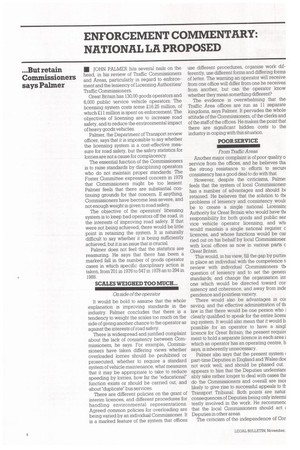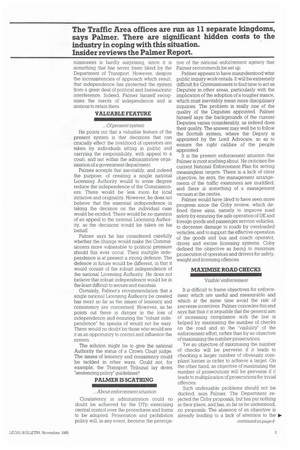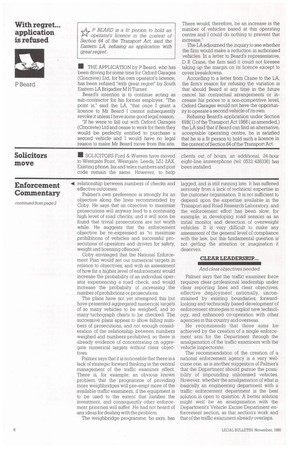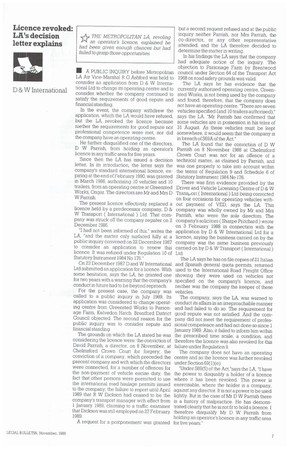ENFORCEMENT COMMENTARY: NATIONAL LA PROPOSED
Page 114

Page 115

Page 116

Page 117

If you've noticed an error in this article please click here to report it so we can fix it.
111 JOHN PALMER hits several nails on the head, in his review of Traffic Commissioners and Areas, particularly in regard to enforcement and the leniency of Licensing Authorities/ Traffic Commissioners.
Great Britain has 130,00 goods operators and 6,000 public service vehicle operators. The licensing system costs some £16.25 million, of which £11 million is spent on enforcement. The objectives of licensing are to increase road safety, and to reduce the environmental impact of heavy goods vehicles.
Palmer, the Department of Transport review officer, says that it is impossible to say whether the licensing system is a cost-effective measure for road safety, but the safety statistics for lorries are not a cause for complacency.
The essential function of the Commissioners is to raise standards by disciplining operators who do not maintain proper standards. The Foster Committee expressed concern in 1979 that Commissioners might be too lenient. Palmer feels that there are substantial continuing grounds for that concern, If anything, Commissioners have become less severe, and not enough weight is given to road safety.
The objective of the operators litensing system is to keep bad operators off the road, in the interests of improving road safety. If that were not being achieved, there would be little point in retaining the system. It is naturally difficult to say whether it is being sufficiently achieved, but it is an issue that is crucial.
Palmer does not feel that the statistics are reassuring. He says that there has been a marked fall in the number of goods operator cases in which specific disciplinary action is taken, from 701 in 1976 to 547 in 1978 an to 294 in 1988.
It would be bold to assume that the whole explanation is improving standards in the industry. Palmer concludes that there is a tendency to weight the scales too much on the side of giving another chance to the operator as against the interests of road safety.
There is widespread and justified complaint about the lack of consistency between Commissioners, he says. For example, Commissioners have taken differing views whether overloaded lorries should be prohibited or prosecuted, whether to require a standard system of vehicle maintenance, what measures that it may be appropriate to take to reduce speeding by lorries, how far the "educational" function exists or should be carried out, and about °duplicate" bus services.
There are different policies on the grant of interim licences, and different procedures for handling environmental representations. Agreed common policies for overloading are being varied by an individual Commissioner. It is a marked feature of the system that offices use different procedures, organise work differently, use different forms and differing forms of letter. The warning an operator will receive from one office will differ from one he receives from another, but can the operator know whether they mean something different?
The evidence is overwhelming that the Traffic Area offices are run as 11 separate kingdoms, says Palmer. It pervades the whole attitude of the Commissioners, of the clerks and of the staff of the offices. He makes the point that there are significant hidden costs to the industry in coping with this situation.
Another major complaint is of poor quality o service from the offices, and he believes tha the strong resistance to efforts to securE consistency has a good deal to do with that.
However, despite the criticisms, Palme: feels that the system of local Commissioner: has a number of advantages and should bE retained. He believes that the solution to thE problems of leniency and consistency woulc be to create a single national Licensinc Authority for Great Britain who would have th( responsibility for both goods and public ser vice vehicle operator licensing, and wh( would maintain a single national register c licences, and whose functions would be car ried out on his behalf by local Commissioner with local offices as now in various parts c Great Britain.
This would, in his view, fill the gap by puffin( in place an individual with the competence ti review with individual Commissioners thi question of leniency and to set the generE standards; and change the organisation int, one which would be directed toward cor sistency and coherence, and away from indE pendence and pointless variety.
There would also be advantages in co: saving, and the effective administration of th law in that there would .be one person who clearly qualified to speak for the entire licen: ing system. It would also mean that it would b possible for an operator to have a singl licence for Great Britain; the present requirE ment to hold a separate licence in each area i which an operator has an operating centre, h says, is inherently unnecessary.
Palmer also says that the present system ( part-time Deputies in England and Wales doE not work well, and should be phased out. appears to him that the Deputies understanc ably take rather longer to deal with cases the do the Commissioners and overall are mm likely to give rise to successful appeals to tt. Transport Tribunal. Both points are natur consequences of Deputies being only intermi tently involved in the work. He recommenc that the local Commissioners should act t Deputies in other areas.
The criticism of the independence of Cor missioners is hardly surprising, since it is something that has never been liked by the Department of Transport. However, despite the inconsistencies of approach which result, that independence has protected the system from a great deal of political and bureaucratic interference. Indeed, Palmer himself recognises the merits of independence and is anxious to retain them.
He points out that a valuable feature of the present system is that decisions that can crucially effect the livelihood of operators are taken by individuals sitting in public and carrying the responsibility, with appeal to a court, and not within the administrative organisation of a government department.
Palmer accepts that inevitably, and indeed the purpose, of creating a single national Licensing Authority would to some degree reduce the independence of the Commissioners. There would be less room for local initiative and originality. However, he does not believe that the essential independence in taking the decision on the individual case would be eroded. There would be no question of an appeal to the national Licensing Authority, as the decisions would be taken on his behalf.
Palmer says he has considered carefully whether the change would make the Commissioners more vulnerable to political pressure should this ever occur. Their multiple independence is at present a strong defence. The defence in future would be different, in that it would consist of the robust independence of the national Licensing Authority. He does not believe that robust independence would be in the least difficult to secure and maintain.
Certainly, Palmer's recommendation that a single national Licensing Authority be created has merit so far as the issues of leniency and consistency are concerned. However, as he points out there is danger in the loss of independence and ensuring the "robust independence" he speaks of would not be easy. There would no doubt be those who would see it as an opportunity to control and influence the system.
The solution might be to give the national Authority the status of a Crown Court judge. The issues of leniency and consistency could be tackled in other ways. Could not, for example, the Transport Tribunal lay down 'sentencing policy' guidelines?
Consistency in administration could no doubt be achieved by the DTp exercising central control over the procedures and forms to be adopted. Prosecution and prohibition policy will, in any event, become the preroga tive of the national enforcement agency that Palmer recommends be setup.
Palmer appears to have misunderstood what public inquiry work entails. It will be extremely difficult for Commissioners to find time to act as Deputies in other areas, particularly with the implication of the adoption of a tougher stance, which must inevitably mean more disciplinary inquiries. The problem is really one of the quality of the Deputies appointed. Palmer himself says the backgrounds of the current Deputies varies considerably, as indeed does their quality. The answer may well be to follow the Scottish system, where the Deputy is appointed by the Lord Advocate, so as to ensure the right calibre of the people appointed.
It is the present enforcement situation that Palmer is most scathing about. He criticises the current National Enforcement Plan for setting meaningless targets. There is a lack of clear objective, he says, the management arrangements of the traffic examiners are muddled, and there is something of a management vacuum at the centre.
Palmer would have liked to have seen more progress since the Coby review, which defined three aims, namely to improve road safety by ensuring the safe operation of UK and foreign goods and passenger service vehicles, to decrease damage to roads by overloaded vehicles, and to support the effective operation of the goods and bus and coach operator, driver and excise licensing systems. Coby defined the objective as being to maximise prosecution of operators and drivers for safety, weight and licensing offences.
It is difficult to frame objectives for enforcement which are useful and measurable and which at the same time avoid the risk of perverse incentives. Palmer concedes this and says that thus it is arguable that the general aim of increasing compliance with the law is helped by maximising the number of checks on the road and so the 'visibility" of the enforcement effort, rather than by an objective of maximising the number prosecutions.
Yet an objective of maximising the number of checks will be perverse if it leads to checking a larger number of obviously compliant lorries in order to achieve a target. On the other hand, an objective of maximising the number of prosecutions will be perverse if it leads to multiplication of prosecutions for trivial offences.
Such undeniable problems should not be ducked. says Palmer. The Department rejected the Coby proposals, but has put nothing in thenplace, and has, so far as he understood, no proposals. The absence of an objective is already leading to a lack of attention to the ■ P BEARD is a fit person to hold an operator's licence in the context of Section 64 of the Transport Act, said the Eastern LA refusing an application 'with great regret'.
• THE APPLICATION by P Beard, who has been driving for some time for Oxford Garages (Concrete) Ltd, for his own operator's licence, has been refused with great regret by South Eastern LA Brigadier M H Turner.
Beard's intention is to continue acting as sub-contractor for his former employer. "The point is," said the LA, that once I grant a licence to Mr Beard I cannot subsequently revoke it unless I have some good legal reason.
"If he were to fall out with Oxford Garages (Concrete) Ltd and cease to work for them they would be perfectly entitled to purchase a second vehicle and I would have no legal reason to make Mr Beard move from this site.
• SOLICITORS Ford & Warren have moved to Westgate Point, Westgate, Leeds, LS1 2AX. Existing phone, fax and telex numbers and post code remain the same. However, to help ▪ relationship between numbers of checks and effective outcomes.
Palmer's own preference is strongly for an objective along the lines recommended by Coby. He says that an objective to maximise prosecutions will anyway lead to a continuing high level of road checks; and it will soon be found that trivial prosecutions are not worth while. He suggests that the enforcement objective be re-expressed as "to maximise prohibitions of vehicles and successful prosecutions of operators and drivers for safety, weight and licensing offences".
Coby envisaged that the National Enforcement Plan would set out numerical targets in relation to objectives, and with an assessment of how far a higher level of enforcement would increase the probability of an individual operator experiencing a road check, and would increase the probabilty of increasing the number of prohibitions or prosecutions.
The plans have not yet attempted this but have presented aggregated numerical targets of so many vehicles to be weighed, and so many tachograph charts to be checked The successive plans appear to show falling numbers of prosecutions, and not enough consideration of the relationship between numbers weighed and numbers prohibited; so there is already evidence of concentrating on aggregate numerical targets without clear objectives.
Palmer says that it is noticeable that there is a lack of strategic forward thinking in the central management of the traffic examiner effect. There is for example, an obvious known problem that the programme of providing more weighbridges will pre-empt more of the available traffic examiners, if the equipment is to be used to the extent that justifies the investment, and consequently other enforcement priorities will suffer. He had not heard of any ideas for dealing with the problem.
The weighbridge programme, he says, has There would, therefore, be an increase in the number of vehicles based at this operating centre and I could do nothing to prevent that increase."
The LA adjourned the inquiry to see whether the firm would make a reduction in authorised vehicles. In a letter to Beard's representative, D R Crane, the firm said it could not foresee taking up the margin on its licence except to cover breakdowns.
According to a letter from Crane to the LA, the firm's reason for refusing the variation is that should Beard at any time in the future cancel his contractual arrangements or increase his prices to a non-competitive level, Oxford Garages would not have the opportunity to operate a second vehicle of its own.
Refusing Beard's applicatiion under Section 69B(1) of the Transport Act 1968 ( as amended,) the LA said that if Beard can find an alternative, acceptable operating centre, he is satisfied that he is a fit person to hold such a licence in the context of Section 64 of the Transport Act.
clients out of hours, an additional, 24-hour eight-line answerphone (tel: 0532 426336) has been installed.
lagged, and is still running late. It has suffered seriously from a lack of technical expertise in the customer organisation. It is not sufficient to depend upon the expertise available in the Transport and Road Research Laboratory, and the enforcement effort has been slow, for example, in developing road sensors as an initial monitor and detection of overweight vehicles. It is very difficult to make any assessment of the general level of compliance with the law, but this fundamental question is not getting the attention or imagination it deserves.
Palmer says that the traffic examiner force requires clear professional leadership under clear reporting lines and clear objectives; effective deployment nationally, unconstrained by existing boundaries; forwardlooking and technically based development of enforcement strategies to exploit new technology; and enhanced co-operation with other agencies in this country and overseas.
He recommends that those aims be achieved by the creation of a single enforcement arm for the Department through the amalgamation of the traffic examiners with the vehicle inspectorate The recommendation of the creation of a national enforcement agency is a very welcome one, as is another suggestion of Palmer's that the Department should pursue the possibility of impounding unlicensed vehicles. However, whether the amalgamation of what is basically an engineering department with a traffic enforcement department is the best solution is open to question. A better solution might well be an amalgamation with the Department's Vehicle Excise Department enforcement section, as that section's work and that of the traffic examiners already overlaps. THE METROPOLITAN LA, revoling ks4 an operator's licence, explained he had been given enough chances but had failed to grasp those opportunities.
III A PUBLIC INQUIRY before Metropolitan LA Air Vice-Marshal R G Ashford was held to consider an application from D & W International Ltd to change its operating centre and to consider whether the company continued to satisfy the requirements of good repute and financial standing, In the event, the company withdrew the application, which the LA would have refused, but the LA revoked the licence because niether the requirements for good repute nor professional competence were met, nor did the company have an operating centre.
He further disqualified one of the directors, D W Parrish, from holding an operator's licence in any traffic area for five years.
Since then the LA has issued a decision letter. In its introduction, the letter says the company's standard international licence, expiring at the end of February 1990, was granted in March 1988, authorising 10 vehicles and 10 trailers, from an operating centre at Greensted Works, Ongar. The directors are Mr and Mrs D W Parrish.
The present licence effectively replaced a licence held by a predecessor company, D & W Transport ( International ) Ltd. That company was struck off the company register on 2 December 1986, "I had not been informed of this," writes the LA, "and the matter only surfaced fully at a public inquiry convened on 22 December 1987 to consider an application to renew this licence. It was refused under Regulation 10 of Statutory Instrument 1984 No 176."
On 23 December 1987 D and W International Ltd submitted an application for a licence. With some hesitation, says the LA, he granted one for two years with a warning that the company's conduct in future had to be beyond reproach.
For the present case, the company was called to a public inquiry in July 1989. Its application was considered to change operating centre from Greensted Works to Parsonage Farm, Kelvedon Hatch. Brentford District Council objected. The second reason for the public inquiry was to consider repute and financial standing.
The grounds on which the LA stated he was considering the licence were the conviction of David Parrish, a director, on 8 November, at Chelmsford Crown Court for forgery; the conviction of a company, which preceded the precent company and with which the directors were connected, for a number of offences for the non-payment of vehicle excise duty; the fact that other persons were permitted to use the international road haulage permits issued to the company; the failure to report until April 1989 that R W Dickson had ceased to be the company's transport manager with effect from 1 January 1989; claiming to a traffic examiner that Dickson was still employed on 27 February 1989.
A request for a postponement was granted but a second request refused and at the public inquiry neither Parrish, nor Mrs Parrish, the co-director, or any other representative attended, and the LA therefore decided to determine the matter in writing.
In his findings the LA says that the company had adequate notice of the inquiry. The objection to Parsonage Farm by Brentwood council under Section 64 of the Transport Act 1968 on road safety grounds was valid.
The LA says he has evidence that the currently authorised operating centre, Greensted Works, is not being used by the company and found, therefore, that the company does not have an operating centre. "There are seven vehicles specified (and 10 trailers authorised)," says the LA. "Mr Parrish has confirmed that some vehicles are in possession in his telex of 31 August, As these vehicles must be kept somewhere, it would seem that the company is in breach of S69A of the Act."
The LA found that the conviction of D W Parrish on 8 November 1988 at Chelmsford Crown Court was not for an offence of a technical matter, as claimed by Parrish, and was one properly to take into account within the terms of Regulation 9 and Schedule 6 of Statutory Instrument 1984 No 176.
There was firm evidence provided by the Driver and Vehicle Licensing Centre of D & W Transport ( International ) Ltd being convicted on four occasions for operating vehicles without payment of VED, says the LA. This company was wholly owned by Mr and Mrs Parrish, who were the sole directors. The company's solicitors ( Sharpe Pritchard ) wrote on 3 February 1988 in connection with the application by D & W International Ltd for a licence, saying the business carried on by the company was the same business previously carried on by D & W Transport ( International ) Ltd.
The LA says he has on file copies of 21 Italian and Spanish general quota permits, returned used to the International Road Freight Office showing they were used on vehicles not specified on the company's licence, and neither was the company the keeper of these vehicles.
The company, says the LA, was warned to conduct its affairs in an irreproachable manner and had failed to do so. The requirement for good repute was not satisfied. And the company did not meet the requirement of professional competence and had not done so since 1 January 1989. Also, it failed to inform him within the prescribed time scale, a condition, and therefore the licence was also revoked for this failure under Regulation 9.
The company does not have an operating centre and so the licence was further revoked under Section 69(1)(e).
"Under S69(5) of the Act, "says the LA, "I have the power to disqualify a holder of a licence where it has been revoked. This power is exercisable, where the holder is a company, against any director. It is not a power to be used lightly. But in the case of Mr D W Parrish there is a history of malpractice. He has demonstrated clearly that he is not fit to hold a licence. I therefore disqualify Mr D W Parrish from holding an operator's licence in any traffic area for five years."


























































































































































